Speciality diving with Southampton Scuba Diving
As you become more and more experienced at diving you will find that some topics of diving will appeal to you more than others. If you would like to broaden your abilities to dive in places many haven’t and pursue your areas of interest in diving, then try a PADI speciality course. There are a wide range of courses available and each one offers a certificate at the end and enabling you to become a speciality diver in certain areas of diving.
At Southampton Scuba Divers we teach the following PADI speciality courses:
PADI Dry Suit Diver
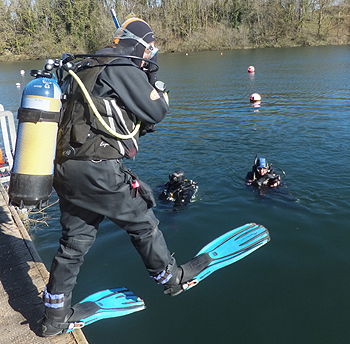
Wanna stay warm, toasty and dry on a dive? Unlike a wetsuit, a dry suit seals you off from the outside water and that keeps you warm! Even in surprisingly cold water.
Cost of course: £195 plus entry to dive sites.
- Prerequisites:
- You must be 10 years or older.
- Open Water Diver
Find out more
What You Learn
Gain the knowledge and skills to safely put on, dive with, remove and store a dry-suit. Get introduced to the different types of suits so you can make a very informed decision if considering purchasing your own dry suit. You learn:
- Dry suit buoyancy control skills
- Dry suit maintenance, storage and basic repair
- Undergarment (fleece or overall-type garments worn under the dry suit) options
Practical skills you’ll master in this course:
- Dry Suit Familiarization
- Safety Checks
- Entry Techniques
- Buoyancy Check
- Descent techniques
- Fin Pivot
- Hover
- Excess gas in feet emergency roll drill
- Stuck inflator emergency drill
- Stuck exhaust valve emergency drill
- Ascent procedure·
- Remove and replace scuba unit and weight belt on the surface
- Exit techniques· Removal of dry suit, storage and maintenance
The Fun Part
Dry suits let you dive more challenging dive sites, and extend your dive season. When you have the right cold water scuba diving attire, you can stand up to the elements and take advantage of the generally better visibility offered by winter months—especially at inland dive sites such as quarries and lakes. As a dry suit diver, you’re equipped to scuba dive some of the world’s incredible dive sites in the world’s cooler regions that are best enjoyed in a dry suit even in their warmer months.
PADI Deep Diver Course
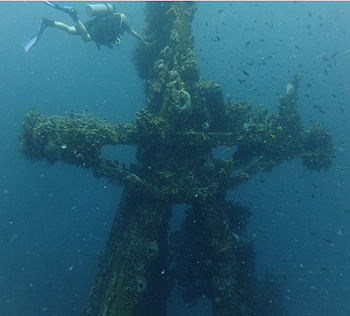
There’s something exciting and mysterious about the depth that attracts divers. As a PADI Advanced Diver you can only dive to 30m, but with a PADI Deep Diver, you can go to the maximum recreational limit of 40m.
Cost of course: £295 plus entry to dive sites and boat fees.
- Prerequisites:
- You must be at least 15 years old
- Adventure Diver
Find out more
What You Learn
- Techniques for diving in the deeper range of 18-40 metres/ 60-130 feet
- Deep scuba diving equipment considerations
- Experience in planning, organising and making at least four deep dives under supervision
The Fun Part
The fun part about this course is the opportunity to explore the deep. It’s exhilarating..
PADI Enriched Air Diver
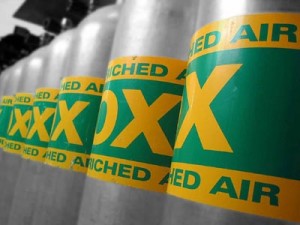
Scuba Diving with Enriched Air Nitrox - the PADI Enriched Air Diver course is PADI’s most popular specialty scuba diving course, and it’s easy to see why. Scuba diving with enriched air nitrox gives you more no decompression dive time. This means more time underwater, especially on repetitive scuba dives.
Cost of course: £155
- Prerequisites:
- You must be at least 12 years old
- Open Water Diver
Find out more
What You Learn
- Techniques for getting more dive time by using enriched air nitrox
- Enriched air scuba diving equipment considerations
- Enriched air considerations, including managing oxygen exposure, how to tell what’s in your scuba tank and how to set your dive computer
The Fun Part
You can typically stay down longer and get back in the water sooner. No wonder many divers choose this as their very first speciality.
PADI Emergency O2 Provider
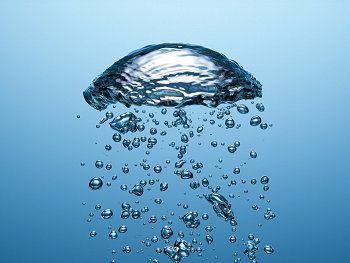
Be the one ready to help a fellow diver should the need arise by becoming a PADI Emergency Oxygen Provider.
Cost of course: £125
- Prerequisites:
- None
Find out more
What You Learn
- Recognise diving illnesses treatable by emergency oxygen
- Properly setup equipment
- Administer emergency oxygen
The Fun Part
Breathe easy—knowing that you know how to recognise illnesses treatable by emergency oxygen. Being the best buddy you can be means being prepared – especially in a time of need.
PADI Search and Recovery
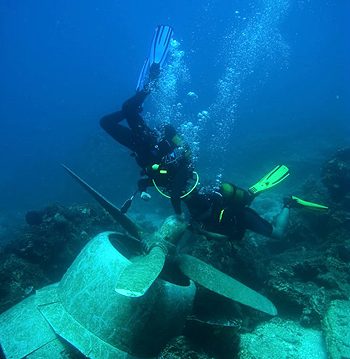
Have you ever dropped something in the water? Are you looking for lost “treasure”? The PADI Search and Recovery Diver Speciality course will teach you effective ways to find objects underwater and bring them to the surface. Small, large or just awkward, there is a way to bring them up.
Cost of course: £295 plus entry to dive sites
- Prerequisites:
- Must be 12 years or older
- Advanced Open Water
Find out more
What You Learn
- Search and recovery dive planning, organization, procedures, techniques and how to deal with potential problems
- How to locate large and small objects using search patterns
- How to use a lift bag and other recovery methods
- Limited visibility search techniques
The Fun Part
Find lost items and lift them to the surface. It’s fun to use the lift bag. Not only are these skills fun, but very practical and ultimately useful because eventually, you’ll lose something in the water. As a Search and Recovery Diver, you’ll know how to search for and recover it.
PADI Wreck Diver
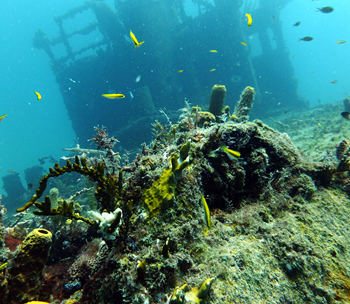
Whether sunk on purpose as an artificial reef or the result of mishap, wrecks open fascinating windows to the past. Most divers find wrecked ships, airplanes and even automobiles nearly irresistible because they’re intriguing to explore, exciting avenues of discovery, and usually teeming with aquatic life. The PADI Wreck Diver course teaches you the ins and outs of rewarding, responsible wreck diving.
Cost of course: £295 plus entry to dive sites and boat fees
- Prerequisites:
- Must be 15 years or older
- Adventure Diver
Find out more
What You Learn
- Techniques for diving exploring shipwrecks, and how to avoid common hazards
- How to research and learn the background of your favourite wrecks
- Wreck scuba diving equipment considerations
- Considerations and techniques for entering intact wrecks
- Experience in planning, organising and making at least four wreck dives under the supervision of your PADI Instructor
The Fun Part
The fun part of the PADI Wreck Diver course is visiting wrecks, unlocking mysteries and starting to gain the knowledge and experience that allows you to see things that others overlook. Sometimes, only the trained, experienced eye recognizes that a small hole or open door likely caused the vessel’s demise.
PADI Emergency First Responder

CPR and First Aid: Emergency First Response Primary and Secondary Care First aid and CPR are good skills for anyone involved in adventure sports – just in case. And, you need these skills for the PADI Rescue Diver course.
Emergency First Response is a PADI affiliate that specializes in teaching these lifesaving skills – and they’re for anyone, not just divers.
Cost of course: £135 (A refresher course: £105)
- Prerequisites:
- Care about other people and want to be able to assist them in a medical emergency
Find out more
What You Learn
- BLS (Basic Life Support) CPR and rescue breathing at the layperson level
- Preventing and caring for shock
- Spinal injury management
- Use of barriers to reduce disease transmission risk
- Basic first aid and first aid kit considerations
The Fun Part
The fun part about Emergency First Response training is learning serious medical emergency response skills in an upbeat, positive environment. You gain the confidence that you are prepared to help in an emergency.
PADI Digital Underwater Photography
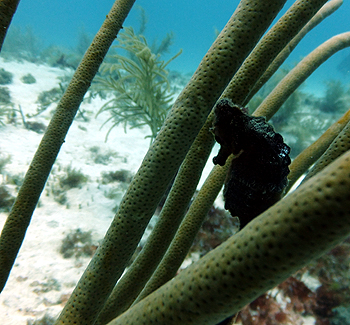
Underwater photography is one of the most popular diving specialties, and the rise of digital underwater photography has made it easier and more fun than ever. The PADI Digital Underwater Photographer course gets you going quickly with today modern digital equipment.
Cost of course: £250 plus entry to dive sites and boat fees
- Prerequisites:
- Must be age 10 or older
- Open Water Diver
Find out more
What You Learn
- How to choose the right underwater camera system for you
- The PADI SEA method for getting great shots quickly
- The three primary principles for good underwater photos
The Fun Part
It's a great way to relive the adventures you’ve had. Plus capture images to share with your friends and family.
PADI Peak Performance Buoyancy
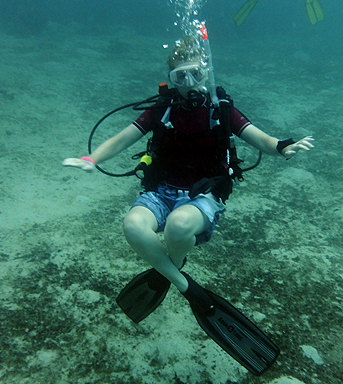
What is neutral buoyancy? Scuba divers like to be neutrally buoyant so they neither sink nor float. It can be a tricky thing. Divers who’ve mastered the highest performance levels in buoyancy stand apart. You’ve seen them underwater. They glide effortlessly, use less air and ascend, descend or hover, almost as if by thought. They interact gently with aquatic life and affect their surroundings minimally. The PADI Peak Performance Buoyancy course refines the basic skills you learned as a PADI Open Water Diver and elevates them to the next level.
Cost of course: £199 plus entry to dive sites
- Prerequisites:
- Must be age 10 or older
- Open Water Diver
Find out more
What You Learn
- How to trim your scuba gear so you’re perfectly balanced in the water
- Nuances in determining weight so you’re not too light nor too heavy by even a slight degree
- How to streamline to save air and move smoothly through the water
- How to hover effortlessly in both a vertical position and a horizontal position
The Fun Part
The fun part of this course is giving your dive skills a polish you may not have thought possible.
PADI Night Diver

As the sun sets, you put on your dive gear, slip on your scuba mask and bite down on your dive regulator and into the underwater night. Although you’ve seen this dive site many times before, this time you drop into a whole new world and watch it come to life under the glow of your dive light.
Cost of course: £250.
- Prerequisites:
- You must be 12 years or older.
- Open Water Diver
Find out more
What You Learn
- Night dive planning, organization, procedures, techniques and potential problems
- How to control your buoyancy at night
- Entries, exits and underwater navigation at night
The Fun Part
Introduce yourself to the whole new cast of critters that comes out after the sun goes down. Nocturnal aquatic life, since many of the plants and animals you'll see are different. See your favourite dive sites from a whole new perspective at night.
PADI Boat Diver
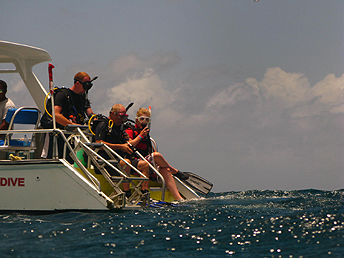
Much of the world's best scuba diving is accessible only by boat. Whether you've never made a boat dive or you've logged dozens, the PADI Boat Diver Specialty course will benefit you because boats in various parts of the world do things differently.
Cost of course: £195 plus cost of boat.
- Prerequisites:
- You must be 10 years or older.
- Open Water Diver
Find out more
What You Learn
The PADI Boat Diver course will expand your knowledge about boats from small inflatables to large liveaboards. You'll gain experience scuba diving by completing two dives from a boat in your local area and learn:
- Boat terminology
- Boat diving procedures and etiquette, including how to enter and exit, and where to stow your gear
- Boating safety, including how to locate safety equipment
The Fun Part
Scuba diving from a boat is fun and relatively easy because you usually descend directly onto your dive site. Diving from a boat gives access to wrecks and reefs not accessible from the shore.
PADI Drift Diver
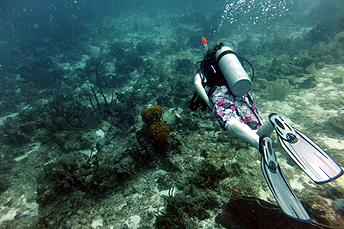
The PADI Drift Diver Speciality course teaches you how to enjoy going with the flow as you scuba dive using ocean currents to glide along. It feels like flying – except that you're underwater using scuba equipment. Drift diving can be relaxing and exhilarating at the same time. If this sound like fun, then the Drift Diver course is for you.
Cost of course: £225 plus cost of boat.
- Prerequisites:
- You must be 12 years or older.
- Open Water Diver
Find out more
What You Learn
Along with drift diving techniques and procedures, you'll:
- Receive an introduction to drift diving equipment – floats, lines and reels
- Get an overview of aquatic currents – causes and effects
- Practice with buoyancy control, navigation and communication during two drift dives
- Learn techniques for staying close to a buddy or together as a group as you float with the current
The Fun Part
Enjoy a relaxing and effortless dive by drifting along with the current while enjoying the marine life.
Notes:
Before we can accept you on a diving course, you'll need to complete this medical form. If you answer "Yes" to any of the questions, you'll need to obtain a fit to dive note from your GP.
